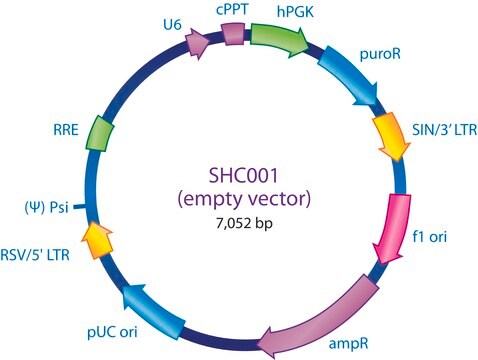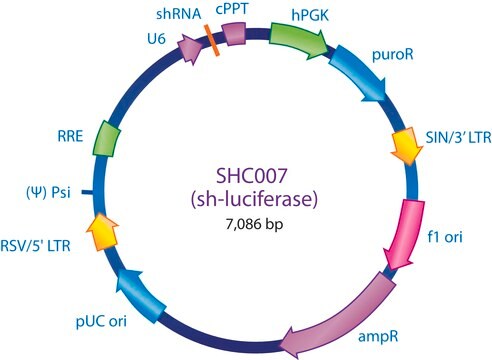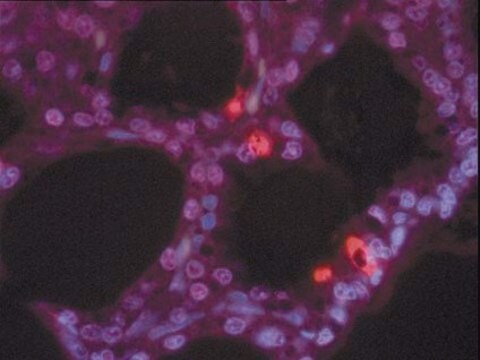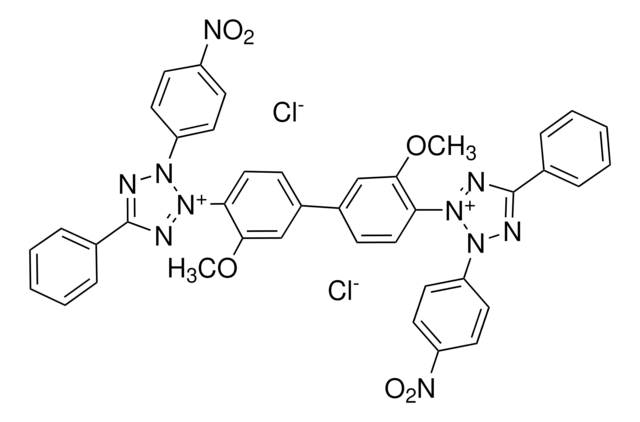OGS102
PSF-CMV-FLUC - CMV FIREFLY LUCIFERASE PLASMID
plasmid vector for molecular cloning
Sinónimos:
cloning vector, expression vector, molecular cloning vector, plasmid, plasmid vector, snapfast vector, vector
About This Item
Productos recomendados
form
buffered aqueous solution
mol wt
size 5936 bp
bacteria selection
ampicillin
origin of replication
pUC (500 copies)
peptide cleavage
no cleavage
promoter
Promoter name: CMV
Promoter activity: constitutive
Promoter type: mammalian
reporter gene
firefly luciferase
shipped in
ambient
storage temp.
−20°C
General description
Promoter Expression Level:PSF-CMV-FLUC-CMV firefly luciferase plasmid contains the mammalian CMV promoter to drive gene expression. We have tested all of our mammalian promoters in a range of cell types and CMV is consistently the strongest in those we have studied. However there are many reports of the CMV promoter demonstrating silencing by methylation in long-term culture.
Application
By positioning all of our genes in the same location it allows them to be transferred between plasmids using the same cloning method and restriction sites regardless of the plasmid being used from our product range. Inserting a new gene into this plasmid should be easily possible using a range of standard restriction enzyme sites that flank the gene currently in the vector.
Multiple cloning site notes: In the multiple cloning site there are two important restriction sites called BsgI and BseRI sites. These sites both cut the DNA at the same position and cleave the stop codon of the gene in the multiple cloning site in this plasmid thereby producing a TA overhang. This overhang is compatible with any of our peptide or reporter fusion tag plasmids also cut with either of these enzymes. This allows seamless C-terminal fusions to be made with the gene in this multiple cloning site using a single cloning step from our C-terminal peptide and reporter tag product range. Normally the easiest method is to clone the C-terminal tag from our other plasmid products into this plasmid using BsgI or BseRI and the downstream ClaI restriction site.
BseRI and BsgI sites are non-palindromic and cleave a defined number of bases away from their binding sites. This allows them to cut the upstream stop codon in the gene in this plasmid regardless of the gene sequence.
Sequence
Analysis Note
Related product
Storage Class
12 - Non Combustible Liquids
flash_point_f
Not applicable
flash_point_c
Not applicable
Certificados de análisis (COA)
Busque Certificados de análisis (COA) introduciendo el número de lote del producto. Los números de lote se encuentran en la etiqueta del producto después de las palabras «Lot» o «Batch»
¿Ya tiene este producto?
Encuentre la documentación para los productos que ha comprado recientemente en la Biblioteca de documentos.
Protocolos
Sigma-Aldrich presents a technical article to help you choose the right SnapFast™ vector to meet your needs.
Nuestro equipo de científicos tiene experiencia en todas las áreas de investigación: Ciencias de la vida, Ciencia de los materiales, Síntesis química, Cromatografía, Analítica y muchas otras.
Póngase en contacto con el Servicio técnico








